London’s food-to-go scene is a vibrant marketplace and clearly thriving, given the number of operators jostling for share literally side-by-side. However, traditional c-store retailers are conspicuous by their absence. They have not secured a foothold in these high traffic, cosmopolitan locations and are not participating across the key food-to-go themes of fresh, healthy and instant. These stores are losing or have lost their relevance for today’s time-pressed, health-conscious and digitally savvy consumers. As such, they are being squeezed out of the marketplace by a new breed of food-to-go players who are anticipating key customer needs and increasingly delivering on them with new technologies and ease.
Traditional c-store retailers really are missing a trick in London, unlike their counterparts in other European capitals, where retailers like Centra and Reitan 7-Eleven are thriving in food-to-go in Dublin and Copenhagen, respectively—and it’s a sizeable U.K. prize.
The IGD forecasts the U.K.’s food-to-go market will be worth £23.4 billion ($28.9 billion) by 2024, up from £18.5 billion in 2019, and the channel will experience double the growth of the wider U.K. food and grocery market (12.5%) during the next five years.
Hive of Activity
The capital city is alive with a raft of retailers vying for a share of the food-to-go pie and across all dayparts: breakfast, lunch and dinner, plus snacking. Quality and speed are key watchwords, regardless of store format.
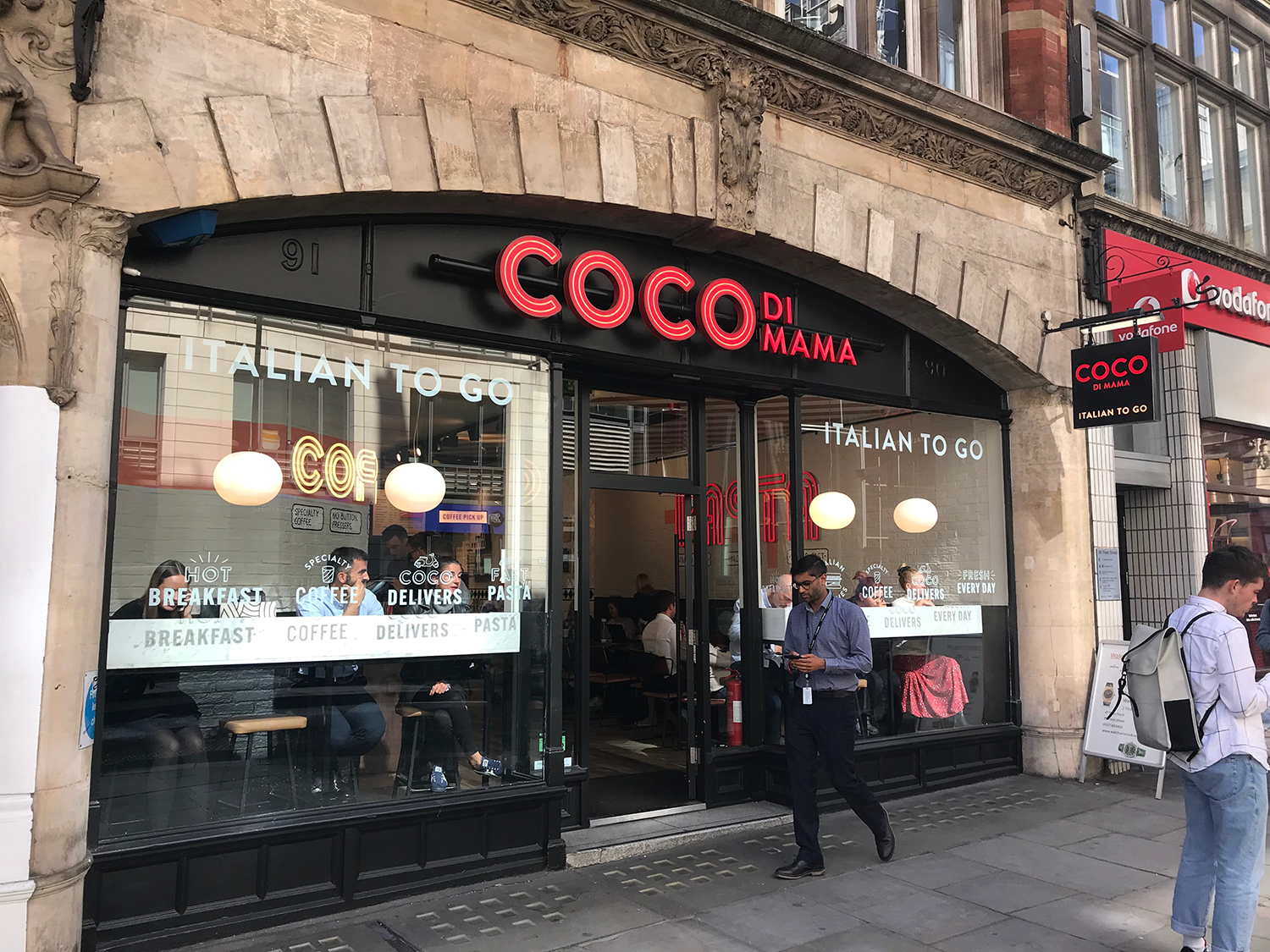
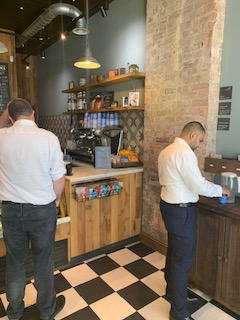 Coco di Mama, for example, promotes food and coffee that is “Italian style, made fresh, super-fast,” while a couple of doors down Caffè Nero operates an express format with limited seating, a grab and go chiller and a large serve-over counter for coffee and iced drinks. Caffè Nero Express is also helping to speed the customer’s journey with a new app, which enables users to collect loyalty stamps on their phone, pay quickly and securely and earn rewards.
Coco di Mama, for example, promotes food and coffee that is “Italian style, made fresh, super-fast,” while a couple of doors down Caffè Nero operates an express format with limited seating, a grab and go chiller and a large serve-over counter for coffee and iced drinks. Caffè Nero Express is also helping to speed the customer’s journey with a new app, which enables users to collect loyalty stamps on their phone, pay quickly and securely and earn rewards.
In London, c-stores are being squeezed out of the marketplace by a new breed of food-to-go players.
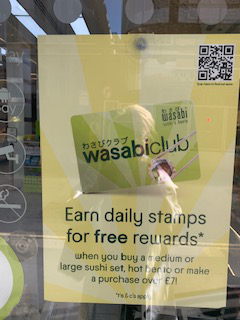
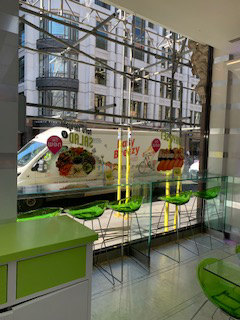 Wasabi promotes its loyalty scheme, Wasabiclub, which enables customers to earn daily stamps for free rewards on medium or large sushi sets, hot bento or when they make a purchase of more than £7.00. The store caters to dine-in customers with communal seating areas and stools and take-away purchases with two queuing systems—one for hot food and one for sushi—to speed service.
Wasabi promotes its loyalty scheme, Wasabiclub, which enables customers to earn daily stamps for free rewards on medium or large sushi sets, hot bento or when they make a purchase of more than £7.00. The store caters to dine-in customers with communal seating areas and stools and take-away purchases with two queuing systems—one for hot food and one for sushi—to speed service.
Sustainability is high on the agenda at Birley Sandwiches, where customers are offered a 10% discount if they bring a reusable coffee cup and are encouraged to recycle the store’s salad bowl—made from 100% recyclable PET and reusable up to 15 times. Plastic straws are gone, and plastic cutlery is giving way to fully compostable cutlery, while the salad bowl bases for the shop’s protein salads are made from fully recycled pulp paper.
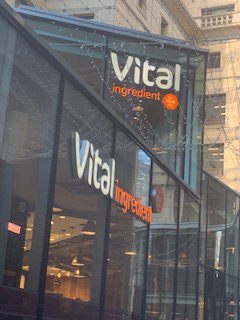 Vital Ingredient appeals to time-pressed consumers to “beat the queue” by downloading its app. Like Birley Sandwiches, personalization is key with “eat your way” and “create your own” menu boards. The retailer states it is also “Proud to buy British,” playing to those customers interested in food provenance. The offer includes tossed salads, hot food, breakfast, smoothies and coffee plus street food and the omnipresent egg bowls. There’s seating on two floors, but service is focused on breakfast and lunch since the store opens at 7 a.m. and closes at 4 p.m.
Vital Ingredient appeals to time-pressed consumers to “beat the queue” by downloading its app. Like Birley Sandwiches, personalization is key with “eat your way” and “create your own” menu boards. The retailer states it is also “Proud to buy British,” playing to those customers interested in food provenance. The offer includes tossed salads, hot food, breakfast, smoothies and coffee plus street food and the omnipresent egg bowls. There’s seating on two floors, but service is focused on breakfast and lunch since the store opens at 7 a.m. and closes at 4 p.m.
M&S Food To Go offers coffee to go plus bakery items, chilled drinks, hot snacks and sandwiches. There’s fresh fruit on sale, as well as alcohol in a slimline chiller, fresh flowers and chocolates. Nodding to the consumer demand for fresh and quality food, baguettes carry labels stating, “freshly made in-store.”
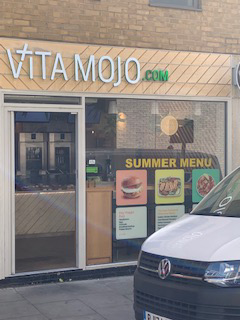
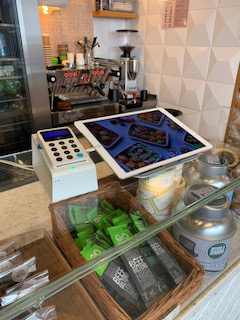 Vita Mojo seems to have personalization down to a tee. Customers can order—either remotely online or from in-store tablets—personalize and then collect. Above the service counter, digital displays list in-store and online orders, which are ready to collect. According to a staff member, there’s a fairly even split between online and in-store ordering, although online account users are rewarded with Mojos—virtual tokens linked to their online account, which are earned by ordering online and rating the meal, and can be used for discounts on meals. The menu, which includes Chicken Schnitzel Milanese Salad and a Spicy Chicken Noodle Salad, is geared to the lunchtime trade, and the store is at its busiest between 12 and 2 p.m.
Vita Mojo seems to have personalization down to a tee. Customers can order—either remotely online or from in-store tablets—personalize and then collect. Above the service counter, digital displays list in-store and online orders, which are ready to collect. According to a staff member, there’s a fairly even split between online and in-store ordering, although online account users are rewarded with Mojos—virtual tokens linked to their online account, which are earned by ordering online and rating the meal, and can be used for discounts on meals. The menu, which includes Chicken Schnitzel Milanese Salad and a Spicy Chicken Noodle Salad, is geared to the lunchtime trade, and the store is at its busiest between 12 and 2 p.m.
The European market for takeaway and delivery has grown faster than global GDP in the past five years and is outgrowing eating in. Changes in lifestyle mean consumers are spending more of their disposable income. Further, the takeaway delivery market is estimated to be worth £6.16 billion, while the restaurant market is worth £59 billion, highlighting the opportunity for delivery. Digital penetration continues to grow apace too—up 37%. Key players in the U.K. include Just Eat (25%) and Deliveroo (4%).
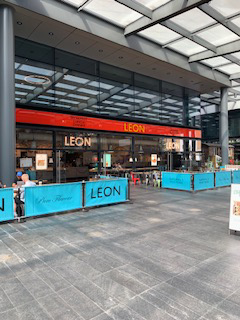
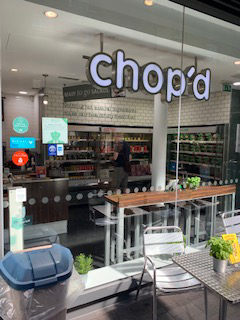 In Spitalfields Old Market, LEON is setting a new standard for great tasting, healthy food and making vegetarian and vegan options more mainstream. At nearby Chop’d, health and sustainability were very much to the fore with a breakfast menu—served until 10:30 a.m.—featuring steamed eggs, Bircher muesli, dairy-free porridge, cold-pressed juice, low-fat yogurt pots and sourdough and rye toast. Chop’d was also promoting its new 100% recycled, U.K.-made packaging.
In Spitalfields Old Market, LEON is setting a new standard for great tasting, healthy food and making vegetarian and vegan options more mainstream. At nearby Chop’d, health and sustainability were very much to the fore with a breakfast menu—served until 10:30 a.m.—featuring steamed eggs, Bircher muesli, dairy-free porridge, cold-pressed juice, low-fat yogurt pots and sourdough and rye toast. Chop’d was also promoting its new 100% recycled, U.K.-made packaging.
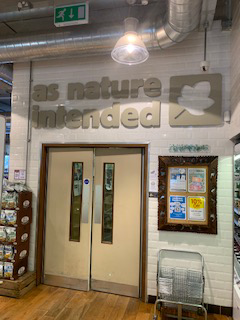 At mini supermarket As Nature Intended the emphasis is firmly on health and wellness, natural and organic. Exterior signage promotes organic and the #FeedYourHappy. Inside, fresh produce is loosely displayed, and there’s a self-service seeds and grain bar, with floor messaging that promotes using less packaging. The offer is topped off with a beauty and skincare offer plus supplements and herbal remedies.
At mini supermarket As Nature Intended the emphasis is firmly on health and wellness, natural and organic. Exterior signage promotes organic and the #FeedYourHappy. Inside, fresh produce is loosely displayed, and there’s a self-service seeds and grain bar, with floor messaging that promotes using less packaging. The offer is topped off with a beauty and skincare offer plus supplements and herbal remedies.
The European market for takeaway and delivery has grown faster than global GDP in the past five years.

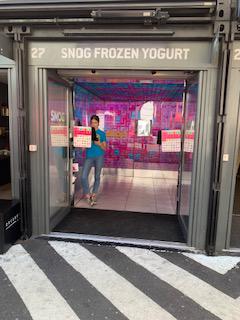 Boxpark provides a food and retail park made out of refitted shipping containers. The food offer is fresh and diverse and includes vegan, kebabs, burgers, Caribbean, chicken, duck, pizza, craft beer, coffee, wines and spirits. The concept for customization is evident again at Snog Frozen Yogurt, where customers order from in-store iPads and choose from a variety of flavors, sizes and toppings before their personal pot is delivered down an in-store hatch. Pitched as a place where consumers can eat, drink, shop and play, Boxpark provides a true destination in the capital.
Boxpark provides a food and retail park made out of refitted shipping containers. The food offer is fresh and diverse and includes vegan, kebabs, burgers, Caribbean, chicken, duck, pizza, craft beer, coffee, wines and spirits. The concept for customization is evident again at Snog Frozen Yogurt, where customers order from in-store iPads and choose from a variety of flavors, sizes and toppings before their personal pot is delivered down an in-store hatch. Pitched as a place where consumers can eat, drink, shop and play, Boxpark provides a true destination in the capital.
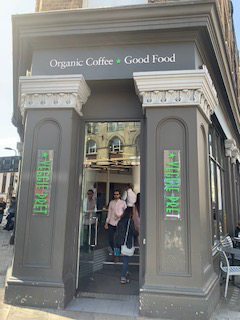 Shoreditch is also home to one of four Veggie Pret stores in the U.K., due to the high levels of vegetarian sales in the area. Serving a meat-free menu (although “omnivores are welcome”) and organic coffee, the store has a large sales area for busy lunchtime traffic but with seating both up and downstairs. Veggie recipes created at Veggie Pret are rolled out to Pret shops around the world, the retailer reports.
Shoreditch is also home to one of four Veggie Pret stores in the U.K., due to the high levels of vegetarian sales in the area. Serving a meat-free menu (although “omnivores are welcome”) and organic coffee, the store has a large sales area for busy lunchtime traffic but with seating both up and downstairs. Veggie recipes created at Veggie Pret are rolled out to Pret shops around the world, the retailer reports.
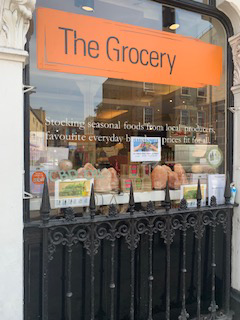 The Grocery really does bring online into the offline world. The store focuses on organic and natural food and wine. The shop windows promote seasonal and local lines with displays featuring artisan bread and magnificent, multicolor meringues. Fresh produce is displayed in a market stall style, bursting with color. There’s an impressive wine department, a selection of greeting cards and wrapping paper and even an Amazon locker for online order collection tucked away around in a corner of the shop. The Grocery also offers delivery of food and wine via Deliveroo, cleverly extending its accessibility. Downstairs, meanwhile, there are treatment rooms offering massage and healing therapies.
The Grocery really does bring online into the offline world. The store focuses on organic and natural food and wine. The shop windows promote seasonal and local lines with displays featuring artisan bread and magnificent, multicolor meringues. Fresh produce is displayed in a market stall style, bursting with color. There’s an impressive wine department, a selection of greeting cards and wrapping paper and even an Amazon locker for online order collection tucked away around in a corner of the shop. The Grocery also offers delivery of food and wine via Deliveroo, cleverly extending its accessibility. Downstairs, meanwhile, there are treatment rooms offering massage and healing therapies.
Back upstairs, alongside the grocery offer, The Grocery offers premium health and beauty products and creatively sells self-serve elderflower cordial and strawberry and almond milkshakes from machines most retailers would use for neon-colored slush. The store also includes a bar and café area with stool and table seating, serving salads and vegan samosas.
This article was reprinted with permission from Global C-Store Focus, the monthly newsletter from U.K.-based Insight; www.insightresearch.co.uk.